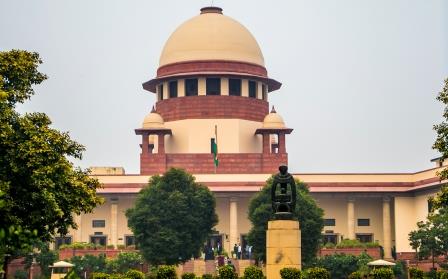New Delhi: Chief Justice of India (CJI) D.Y. Chandrachud, heading the five-Judge Constitution Bench hearing the slew of petitions challenging the reading down of Article 370, on Monday (August 28) observed that Article 35A while giving special rights to permanent residents of J&K denied fundamental rights to others.
“Article 35A gave special rights and privileges to permanent residents and virtually took away the rights of non-residents. These rights included the right to equal opportunity of state employment, right to acquire property and the right to settle in Jammu and Kashmir,” the CJI remarked while intervening during the submission of solicitor general, Tushar Mehta.
Article 35A of the constitution was inserted in 1954 by a presidential order made under Article 370 of the constitution. Article 35A enabled the Jammu & Kashmir Assembly to define ‘permanent residents’ and allowed it to give Permanent Resident Certificates to people in the state. The permanent residents enjoyed special rights and privileges in regard to employment, acquisition of immovable property, settlements and scholarships, until Article 370 was read down on August 5, 2019.
The CJI also noted that Article 35A had even granted immunity from judicial review to these special privileges.
In response to the CJI’s remark that the current Union government cannot distance itself from its predecessors, Mehta answered that the August 5, 2019 decision was an attempt to correct the mistakes of the predecessor governments. “The mistakes of the past should not befall the future generations,” he responded.
Mehta told the Bench that safai karamcharis (sanitation workers) brought to J&K were not entitled to permanent resident status despite residing in the state for several decades.
Also read: Day 10 of Article 370 Hearing: Union Govt Says J&K’s Accession Was Not Unique
When senior counsel Kapil Sibal referred to Jawaharlal Nehru’s defence of restrictions on outsiders, Mehta suggested that it was a mistake, due to which the state was deprived of investments.
He also highlighted the Union government’s claims that post-August 5, 2019, there has been an upswing in investments and tourism. He claimed that the reading down of Article 370 – being challenged in the petitions before the Court – confers fundamental rights on the people in the state by applying the entire Constitution of India, bringing them at par.
Mehta claimed that it is not unusual for the parliament to act as the state legislative assembly during the President’s rule. parliament exercises the power of the state legislature under Article 356(1)(b) in all states, he said.
Mehta also contended that the Proviso to Article 3 of the constitution – dealing with formation of new states and alteration of areas, boundaries or names of existing states – remains suspended under every instance of imposition of President’s rule.
The Proviso states that no Bill for this purpose can be introduced in the parliament except if the President recommends it. Additionally, if the Bill proposes a change in the area, boundaries or name of any of the states, it should be referred to the state legislature for due consideration. The legislature would then be allowed to respond within the period, stipulated by the President or in the reference itself.
Also read: SC Asks AG to Look Into Suspension of J&K Lecturer After His Appearance in Article 370 Hearing
The CJI disagreed with Mehta when the latter sought to equate the views expressed by individual members of parliament describing Article 370 as a temporary provision with that of parliament as a collective body.
Mehta contended that the J&K Constituent Assembly was not a law making body, and the state Constitution was not a document of governance.
Earlier, the bench took serious objection to the suspension of lecturer Zahoor Ahmad Bhat, subsequent to his appearance before the Bench in the ongoing proceedings, by the J&K Education Department. Bhat had appeared as a party-in-person on August 24, and shared his concerns over the reading down of Article 370. He claimed that he found it difficult to teach the principles of Indian constitution and democracy to students, as students ask him whether India is still a democracy after the abrogation.
When Mehta initially sought to justify the suspension saying there were other issues like his appearance in various courts, the bench queried him why the order of suspension mentioned his appearance before the Supreme Court, and why he was not suspended earlier, if there were valid reasons. Following the bench’s request to the Attorney General, R. Venkatramani to look into it, Mehta agreed with the bench that suspension cannot be resorted to as a retribution, and the timing of suspension is indeed not proper.
This article was first published by TheWire and written by V. Venkatesan
Also Read: Accidents On Rise: Gujarat 108 Service Reports 15 Accidents An Hour In 2022












